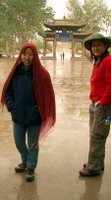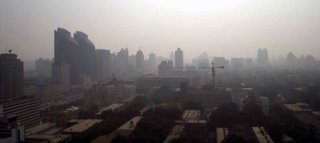So there we were, back in Urumqi, thinking our adventures were coming to a close. It was our last night all together, as Will was to fly back to Beijing the next day. For those of you who want track our final countdown, this means there will be about four more Xinjiang posts as the bodies will keep dropping out, kind of like "Survivor Xinjiang" or some such folly. But we digress.....
On our last night in Urumqi, we decided it was time to head out and find a decent "street" dinner. China in general is a great place to find fast food cooked on street corners throughout most cities. Xinjiang, as we have noted before, had no shortage of street vendors offering grilled lamb, lamb's-head stew, lamb's intestine, leg o' lamb (you get the picture - just think of the shrimp lecture delivered by Bubba in Forrest Gump). Off we set, then, in search of food.
We asked the doorman of our hotel where a good night market was located. He indicated that it was right there on the very street on which we were standing. The very bare, unexciting, empty street. We thought we misunderstood him, asked again, and received the same answer. Coming to the conclusion that he must think we would be satisfied with the 2 overpriced lamb-on-a-stick vendors across the way, we set off down the road to just see what we could find.
The time was 5:26
We started walking down the street, commenting as we went on the possibilities of finding a decent night market and some street vendors and our disappointment in not being able to more effectively communicate with the doorman. About a block from our hotel we passed an alley leading slightly uphill. Our group started to cross the alley.
The time was 5:28
About half of our group had strolled across the alley and started thinking about checking out some of the visable restaurants. We noticed that the restaurants were starting to set up outside tables and we were excited about the prospect of being able to eat and enjoy people watching at the same time.
We heard a load noise start from the alley we had just crossed.
The time was 5:28 and 30 seconds
And the market appeared!From the alley that half of us had just crossed, the massed charge of over 50 street vendor carts rushed forth and, in an almost choreographed dance, swerved left or right as they exited from the alley and dashed for their places along the road upon which we were walking. Metal buckets of red hot coals swung outward as the carts were hurtled in front of us and we could feel their heat as they passed less than a foot away. Our group was separated on either side of the flood as it came so fast that not all of our group had even manage to cross the 10 feet width of the alley. We were laughing and pointing and in complete awe of the madness.
5:35 and from the front of our hotel to over 4 blocks away the road was now lined on both sides with food vendors. The coals were already hot, meat was already prepared, and dishes were being served to the crowd that seemed to have materialized just as mysteriously as the vendors themselves. And not just any old dishes, but foods that we had never seen before were being offered to every passerby.

Here is a pictures of the Wu-Yi night market courtesy of
Imagethief. We even saw
whole lambs cooked and sitting atop carts, some with bows around their necks. Sadly, we did not have our camera with us that evening.
In the spirit of adventure, everyone was suppose to set off and try to find a food they had not eaten before that they wished to try. Though we were tempted, we decided against trying the grubs and locusts we saw. Instead we feasted on lamb heart, aorta, lung, shank (with hooves attached) as well as the standard kebobs. We also tried octopus and an oddly spiced fish and other things that we can no longer remember. We rounded out the meal with fruit and some yogurt/nut/sugar drinks. We then went off to explore the rest of the market and get some desserts. We found some ice cream (though not as good as the handmade creations at the livestock market) and cotton candy! The really cool thing about the cotton candy was that the machine making it was hooked into a bicycle wheel so that the vendor could peddle the bike to generate the energy. You can see a picture of it
here.
Having eventually satiated ourselves we headed back the road to our hotel, stopping at some of the copious raisin sellers to pick up just a few more kilos to take home with us.
Here is yet another photo that someone else took that gives you a wonderful sense of the incredible raisin options.
The moral of this story?
Trust the doorman
 Subtle is just not the way to go here in Beijing. There is no hiding of boxes off in some hard-to-find pharmacy counter here. Nope, this picture was taken in the check out aisle at the grocery store. Who needs candy?
Subtle is just not the way to go here in Beijing. There is no hiding of boxes off in some hard-to-find pharmacy counter here. Nope, this picture was taken in the check out aisle at the grocery store. Who needs candy?
















